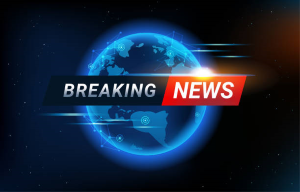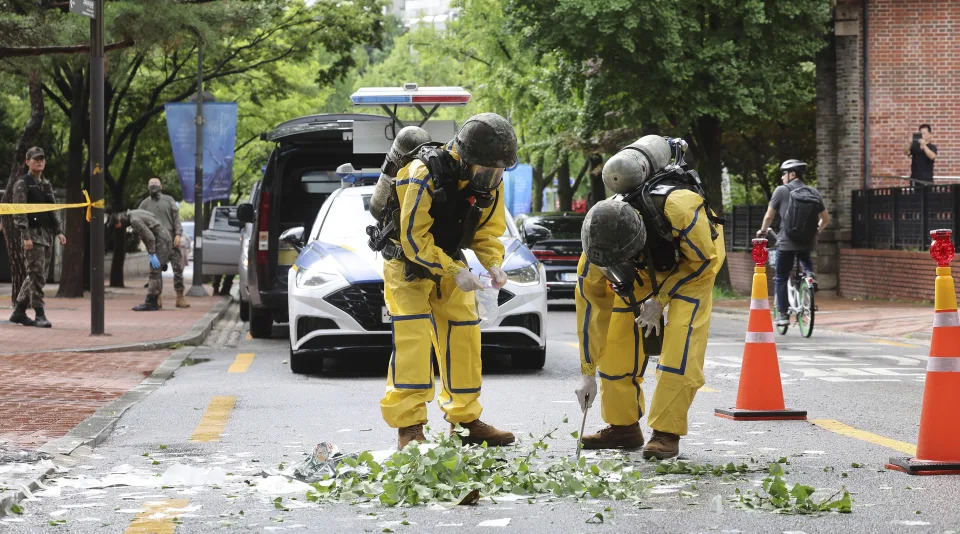Belarus' foreign minister arrives in North Korea for talks expected to focus on Russia cooperation

Belarusian Foreign Minister Maxim Ryzhenkov, left, is greeted by North Korean officials in Pyongyang, North Korea, Tuesday July 23, 2024. Ryzhenkov arrived in North Korea.
Belarus’ foreign minister arrived in North Korea on Tuesday as experts predicted that he and North Korean officials would discuss forming a trilateral anti-Western front also involving Russia.
Belarusian Foreign Minister Maxim Ryzhenkov flew to Pyongyang from Beijing and was greeted by North Korean officials including Vice Foreign Minister Kim Jong Gyu, according to video shot by Associated Press Television News.
During his stay in North Korea, Ryzhenkov is expected to meet North Korean counterpart Choe Son Hui and other senior officials. South Korean officials said Ryzhenkov is Belarus’ first foreign minister to travel to North Korea.
Neither North Korea nor Belarus has disclosed which issues are at stake during Ryzhenkov’s visit. But given the countries’ deepening ties with Russia, experts say his trip will likely center on building North Korea-Belarus-Russia cooperation to better cope with their separate disputes with the West.
During a meeting in Pyongyang in June, North Korean leader Kim Jong Un and Russian President Vladimir Putin signed a pact vowing mutual military assistance if either country is attacked in what analysts called the countries’ biggest deal since the end of the Cold War.
The U.S., South Korea and others have accused North Korea of sending conventional arms to Russia to support its war in Ukraine in exchange for military and economic assistance.
Belarus’ authoritarian President Alexander Lukashenko, for his part, allowed Russia to use his country as a staging ground for the February 2022 full-scale invasion of Ukraine. In 2023, Russia moved some of its tactical nuclear weapons to Belarus.
During a meeting with Putin in the Black Sea resort of Sochi last September, Lukashenko suggested that Belarus could join Russia and North Korea in “three-way cooperation.”
The three countries have struggled with Western sanctions and deepening international isolation — North Korea over its advancing nuclear program, Russia over its invasion of Ukraine and Belarus over its support of the Russian invasion and its 2020 election that was widely criticized as fraudulent as well as human rights abuses.
North Korea and Belarus have had diplomatic relations since the early 1990s. North Korea opened an embassy in Minsk in 2016. Belarus does not have an embassy in Pyongyang.
AfriPrime App link: FREE to download...
https://www.amazon.com/Africircle-AfriPrime/dp/B0D2M3F2JT
North Korea Does ‘Not Care’ About Trump’s Words for Kim Jong Un
North Korea’s state media rebuffed comments that former President Donald Trump made about good ties with leader Kim Jong Un, saying “we do not care” and warned its nuclear arsenal stands ready for any US leader.
The official Korean Central News Agency said in a commentary Wednesday, that while Trump tried to advance personal relations, Pyongyang saw US policy as remaining hostile, adding the former president “did not bring about any substantial positive change.”
The comments are the first from North Korea since Trump touted his personal ties with Kim when he addressed the Republican National Convention last week. Trump said he got along with Kim, who probably wanted the former president back in the White House. “I think he misses me, if you want to know the truth,” Trump said.
The KCNA commentary said personal relations and diplomacy should be kept separate. “Even if any administration takes office in the US, the political climate, which is confused by the infighting of the two parties, does not change and, accordingly, we do not care about this,” the commentary said.
Trump pledged to unleash “fire and fury” against Kim for tests of nuclear bombs and missiles to deliver them to the US in 2017, while KCNA called him a “dotard” and labeled his envoys as “gangsters.” But after the two held a historic summit in Singapore in 2018, the tone changed dramatically, with North Korean officials saying the two leaders had a “mysteriously wonderful” chemistry.
The two reached a bare-bones declaration for denuclearization in Singapore, Kim later briefly halted testing missiles and the US scaled back joint military drills training with South Korea that angered Pyongyang. But Kim made no concrete moves to wind down his arsenal. Meanwhile, he kept adding to his stockpile of fissile material and began testing a new series of modernized, nuclear-capable ballistic missiles soon after Trump abruptly halted a second round of talks with Kim in Vietnam in 2019.
Since taking office, the Biden administration has worked to improve security ties between its two main allies in the region, Japan and South Korea, while making shows of American military might and warning Kim the use of nuclear weapons would mean the end of his rule in North Korea.
Kim has ignored calls from Biden’s White House to return to the bargaining table as he advanced his arsenal of nuclear weapons. Kim has also received support from his economy and military from Russia in exchange for munitions to help Moscow with its assault on Ukraine, the US and its allies have said.
North Korea has yet to make a comment on Biden’s decision not to seek reelection and has made no mention of Vice President Kamala Harris on its major state media outlets.
AfriPrime App link: FREE to download...
https://www.amazon.com/Africircle-AfriPrime/dp/B0D2M3F2JT
Trash dropped by a North Korean balloon falls on South Korea’s presidential compound
Trash from at least one North Korean balloon fell on the South Korean presidential compound Wednesday, raising worries about the security of key South Korean facilities from North Korean provocations.
The rubbish that fell on the ground at the compound in central Seoul contained no dangerous material and no one was hurt, South Korea’s presidential security service said in a statement. But experts say South Korea needs to shoot incoming North Korean balloons at border areas next time, as it's not clear whether North Korea would put in hazardous items in future campaigns.
North Korea's latest balloon launches came days after South Korea boosted its frontline broadcasts of K-pop songs and propaganda messages across the rivals’ heavily armed border. Their tit-for-tat Cold War-style campaigns are inflaming tensions, with the rivals threatening stronger steps and warning of grave consequences.
Seoul officials earlier said North Korea had used the direction of winds to fly balloons toward South Korea, but some of the past balloons had timers that were likely meant to pop the bags of trash midair. The security service gave no further details about the rubbish found at the presidential compound, like whether balloons were discovered along with the trash.
If North Korea is found to have used timers or any other device to deliberately dump trash on key South Korean facilities like the presidential office, it would certainly invite strong response by South Korea. But experts say dropping balloons at ground targets is extremely sophisticated technology and that North Korea would certainly lack such an ability.
The security service refused to disclose whether President Yoon Suk Yeol was at the office at a time. Yoon's office earlier said he has no official schedule on Wednesday.
South Korea’s Joint Chiefs of Staff said earlier Wednesday that North Korean balloons were flying north of Seoul after crossing the border and had urged people to be alert for falling objects.
It was North Korea's 10th such launch since late May. The more than 2,000 huge balloons so far have dropped wastepaper, scraps of cloth, cigarette butts and even manure on South Korea. North Korea has said it was responding to South Korean activists scattering political leaflets across the border via their own balloons.
Experts say North Korea considers South Korean civilian leafleting activities a major threat to its efforts to stop the inflow of foreign news and maintain its authoritarian rule. In furious responses to past South Korean leafletting, North Korea destroyed an empty South Korean-built liaison office in its territory in 2020 and fired at incoming balloons in 2014.
The North’s balloons haven't caused major damage but have raised security jitters among people worried North Korea could use such balloons to drop more hazardous materials like chemical and biological agents.
South Korea said Sunday it was ramping up its anti-Pyongyang propaganda broadcasts from its loudspeakers at all major sites along the land border because North Korea was continuing launches of trash-carrying balloons. South Korea last Thursday restarted its loudspeaker broadcasts for the first time in about 40 days in retaliation for North Korea's previous balloon activities.
Observers say South Korean propaganda broadcasts can demoralize frontline North Korean troops and residents. In 2015, North Korea fired artillery rounds across the border in anger over South Korea's restart of propaganda broadcasts, prompting the South to return fire.
South Korean Joint Chiefs of Staff spokesperson Lee Sung Joon said the ongoing South Korean broadcasts include K-pop songs and news on South Korean economic development. South Korean media reported the broadcasts also contained news on the recent defection of a senior North Korean diplomat and called the mine-planting work by North Korean soldiers at the border “hellish, slave-like lives.”
South Korea has an estimated 40 loudspeakers — 24 stationary and 16 mobile ones. South Korea's military said Monday it was fully operating the fixed loudspeakers and plans to use the mobile loudspeakers as well.
South Korea's military has warned of other unspecified stronger steps if North Korea continues its balloon campaigns. North Korea hasn't made an official response to the South Korean propaganda broadcasts. But last week, Kim Yo Jong, the powerful sister of North Korean leader Kim Jong Un, threatened new countermeasures against South Korean civilian leafleting as she warned that South Korean “scum” must be ready to pay “a gruesome and dear price” over their actions.
AfriPrime App link: FREE to download...
- Questions and Answers
- Opinion
- Story/Motivational/Inspiring
- Technology
- Art
- Causes
- Crafts
- Dance
- Drinks
- Film/Movie
- Fitness
- Food
- Games
- Gardening
- Health
- Home
- Literature
- Music
- Networking
- Other
- Party
- Religion
- Shopping
- Sports
- Theater
- Wellness
- News
- Culture
- War machines and policy




